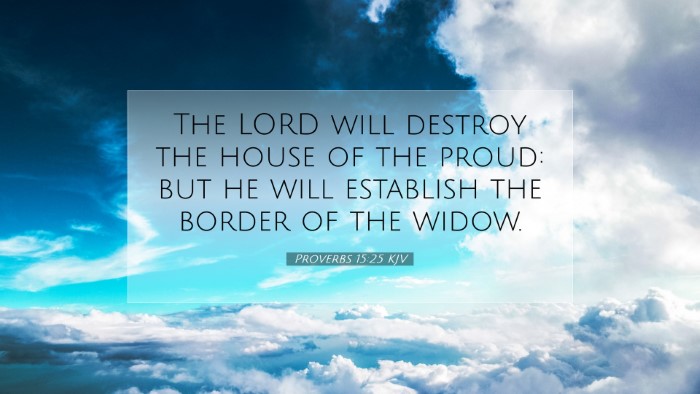Commentary on Proverbs 15:25
Proverbs 15:25 states, "The Lord will destroy the house of the proud: but he will establish the border of the widow." This verse holds profound insights regarding divine justice and the foundational principles of humility and care for the underprivileged.
Overview of the Verse
In this verse, the contrast is clear between the fate of the proud and the protection of the vulnerable—specifically, the widow. It illustrates God's prioritization of justice, indicating that He will bring down those who are arrogant while ensuring security and stability for those who are marginalized.
Insights from Public Domain Commentaries
Matthew Henry's Commentary
Matthew Henry emphasizes the certainty of God's judgment against pride. He notes that “the house of the proud” symbolizes not just physical dwellings but represents the lives and legacies built on arrogance and self-sufficiency. Henry explains that pride ultimately leads to downfall, as God opposes the proud but gives grace to the humble (James 4:6).
Furthermore, Henry highlights the protective nature of God towards the widow. In biblical times, widows were often among the most vulnerable in society. Thus, the promise that God will “establish the border of the widow” underscores His commitment to justice and provision for the needy. It serves as a reminder for believers to embody God’s heart for the marginalized.
Albert Barnes' Notes on the Bible
Albert Barnes expands on the implications of the “house of the proud,” noting that this pride represents an opposition to God’s law and authority. Barnes asserts that this verse serves as a warning that those who rely solely on their achievements and status will face inevitable destruction. He explains that the destruction referred to here may come in various forms—spiritual, social, or eventually physical.
Remarkably, Barnes draws attention to the phrase “He will establish the border of the widow,” reflecting God’s intimate knowledge and care for those in distress. This speaks powerfully to the believer's calling to advocate for justice, mirroring God's intent to defend the weak.
Adam Clarke's Commentary
Adam Clarke provides additional depth to the understanding of this verse by discussing the historical context surrounding pride and vulnerability. He notes that throughout Scripture, pride is often linked to rebellion against God, leading to societal decay. Clarke articulates that God’s destruction of the proud is not merely punitive but serves to restore righteousness in society.
Clarke also emphasizes the significant spiritual implications of God's protection over the widow. He remarks that God's attentiveness towards the widow serves as a model for believers in their community interactions. This passage calls Christians not only to eschew pride but also to actively support and uplift those who are in need.
Theological Reflections
This verse engenders several theological reflections pertinent to current ecclesiastical discussions:
- The Nature of God: The duality of God's nature as a just judge and compassionate protector is evident here. Understanding this nature is crucial for elucidating God’s character in ministry and personal faith.
- Human Responsibility: The responsibility that comes with privilege is highlighted. Those in positions of power and success must remember to regard their status as a stewardship rather than an entitlement.
- The Call to Justice: Proverbs 15:25 explicitly calls for believers to champion the cause of the marginalized, mirroring God’s advocacy for the widow. This principle of care is foundational in Christian ethics.
Practical Applications
From the insights gained, several practical applications can be derived:
- Cultivate Humility: Pastors and leaders should cultivate a spirit of humility, recognizing that all achievements are by God's grace.
- Support Vulnerable Populations: Congregations are called to actively seek opportunities to support widows, orphans, and the impoverished within their communities, embodying the love and justice of God.
- Teach on Pride and Humility: Educational and discipleship programs should focus on the dangers of pride and the blessings of humility, encouraging a culture of support and servanthood within the church.
- Advocate for Justice: Engage in social advocacy that aligns with Scripture, promoting justice and mercy for those who cannot speak up for themselves.


